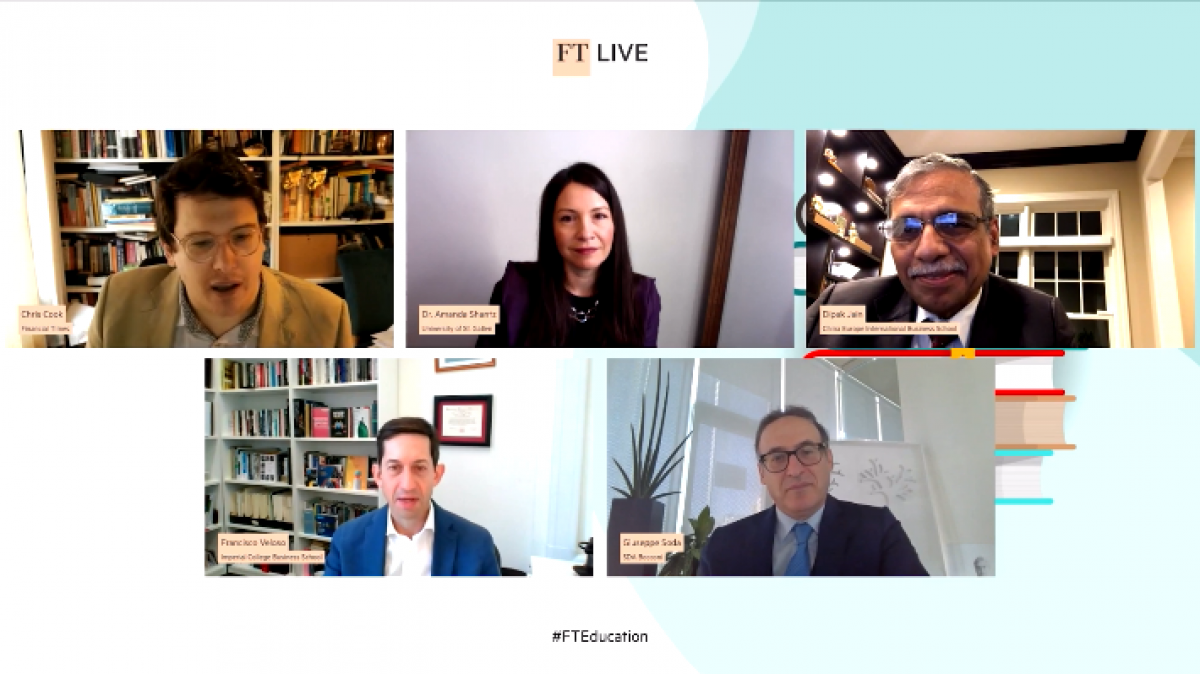Management Education Journey Post COVID-19
February 23, 2022. Shanghai – Management education needs to go on a new D-I-E-T, CEIBS President (European) Dipak Jain told a worldwide audience during a Financial Times livestream centred on the future of the MBA today.
President Jain shared his views during a panel discussion as part of the FT’s The Future of Business Education: Spotlight on MBA online event, which brought together some of the world’s most influential management educators.
As part of the event, the FT’s Chris Cook hosted a 45-minute session which saw University of St. Gallen Professor of Management Amanda Shantz, SDA Bocconi Dean Guiseppe Soda and Imperial Business School Dean Francisco Veloso join President Jain in a frank, yet friendly, exchange.
The panel’s theme was Emerging from COVID: MBA Learning for the Future, and President Jain told the audience that March 2020 brought a situation CEIBS had never encountered before – a single lecture attended by students in many different cities all over the world, in different time zones, alongside those attending in person.
During the warm and lively discussion, President Jain told his fellow panellists of a new approach that would build the foundation for teaching the leaders of the future:
“I think there is a new DIET for management education – D for digital thinking, I for innovative mind-set, E for entrepreneurial spirit and T for team culture,” he said.
Naturally, the pandemic was singled out as a big factor shaping the future of the MBA programs. He went on to say that the pandemic had created a new shift in management education because “business as usual” was not going to return and that fundamental and permanent changes had already taken place.
“Spring 2020 gave birth to a different teaching paradigm– students joining digitally in real time from different corners of the world, and some listening to a recording later,” President Jain said.
“To enhance students learning experience, business schools brought in new pedagogical innovations. For example, the Kellogg School of Management at Northwestern University (USA) introduced virtual course moderators (VCM) who worked with students after each class trying to answer their questions and also arrange meetings with professors if there were still any issues that needed further clarification. Also, Kellogg Professor Mohanbir Sawhney introduced the concept of ‘Lifelong Learning as a Service’.” President Jain said that such a service would significantly enhance alumni loyalty and engagement in the digital economy.
He went on to say that ‘the digital transformation has created a high-tech world, but what we really need today is a high-touch environment, and moving forward, we need to build a high-trust team culture of mutual respect and trust among students, alumni and other stakeholders.’ He further added that ‘the best of management education is ahead of us; challenges coming our way will make us better, not bitter.’
The panel went on to discuss a range of changes influencing the MBA programs all over the world, from the changing nature of how knowledge is delivered to the disadvantages of offline learning, the importance of accreditation, and the growing relevance of environmental, social and governance (ESG) concepts.
One of the key themes identified by the panellists was the increased importance of communication skills in the post-pandemic world, an area which President Jain felt business schools were not always well-equipped to handle, and that working with disciplines traditionally outside the sphere of management education would be a great positive step.
President Jain further explained that ‘soft skills’ needed to manage people cannot be all taught by professors from business schools. He continued that, whilst serving as the Dean of Kellogg School, he organised a course on the works of Shakespeare where he brought in actors from a local theatre - a creative approach to giving students and executives a fresh perspective on communication and presentation skills.
“Developing the best talent is also important for executive education,” President Jain said, adding, “Many executives would like to learn such basic skills, because business is about people - how to motivate them, how to inspire them and how to get the best out of people who work for you or work with you.”
The panellists also discussed MBA assessment systems, with a move away from formal exams emphasising memorisation towards practical problem-solving and experiential learning methods of assessing students.
In his closing remarks, summing up the event, host Chris Cook thanked the participants for an intriguing discussion and said, “I expect to hear more about Professor Jain’s DIET plan in the coming years. I feel that’s an acronym in search of a marketing opportunity.”
In keeping with CEIBS role as a bridge between China and the rest of the world, President Jain concluded by mentioning how much he enjoyed interacting with colleagues from the business education world whom he had not seen for some years, before remarking, “Let’s stay connected, let’s stay in touch and I can only tell you, you all have a friend in Dipak.”













